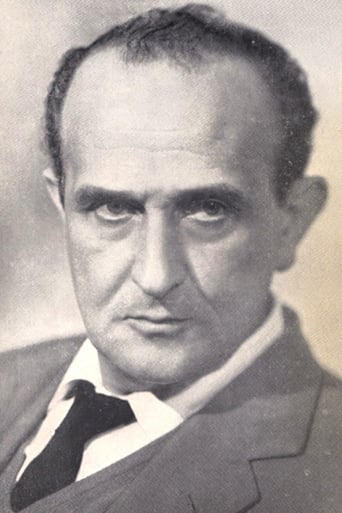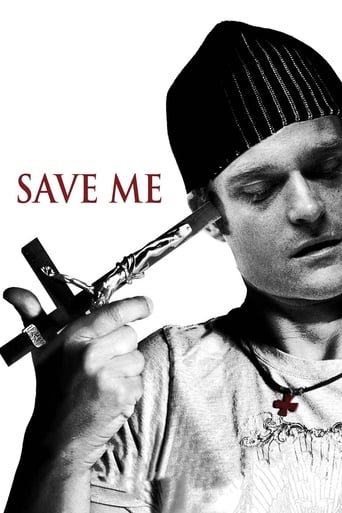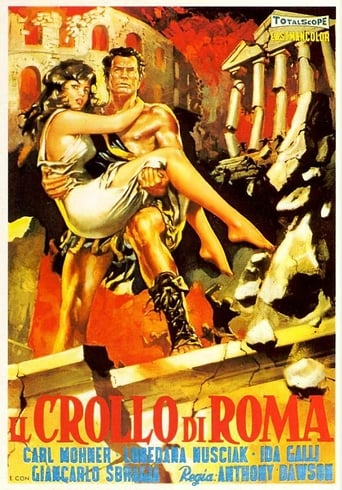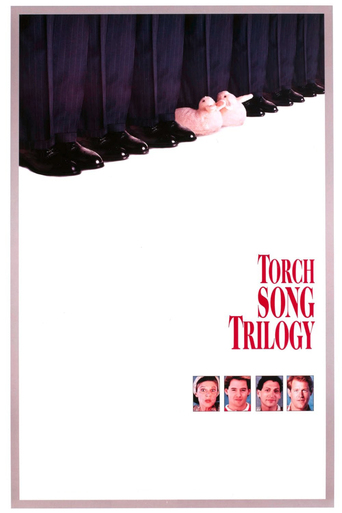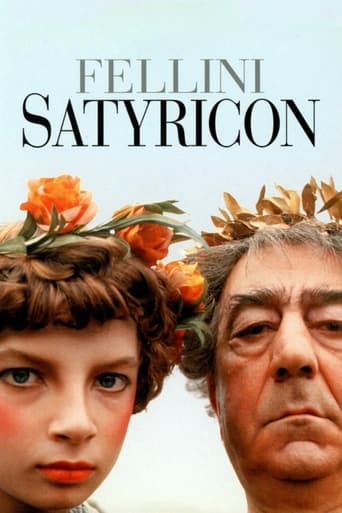

Fellini Satyricon (1970)
After his young lover, Gitone, leaves him for another man, Encolpio decides to kill himself, but a sudden earthquake destroys his home before he has a chance to do so. Now wandering around Rome in the time of Nero, Encolpio encounters one bizarre and surreal scene after another.
Watch Trailer
Cast


Similar titles
Reviews
This film is, in large part, homosexuality seen through a heterosexual male's lens. As a result, it fails at basic things. For instance, the blonde "protagonist" has a decent-looking male lover his age (who is regrettably unattractive in personality) but Fellini insists on having him desire a very homely-looking boy, one who also has an unappealing dully coquettish personality. Why? Obviously, this is to make a negative point about ancient Rome and homosexuality. "Ewww... how decadent, uncomfortable, and wrong it is!" That's apparently supposed to be the reaction. Fellini seems to conveniently exploit ignorance about homosexuality in his often drab little theatrical universe. The irony is probably that, given all of its varying settings and its "art is free!" mantra, the world itself is almost suffocatingly puny. There is a tremendous lack of vision in this film. I wonder if a man even needs to be gay to see how thin it is, just looking at the homosexuality angle. Even the superficially affirming scene with the minotaur may primarily be the sad "dominance" hypothesis reconstituted (where male homosexuality is not common at all in any animal species but is rather merely displays of dominance and submission - sexual aggression). Male lions, for instance, aren't allowed to enjoy sex according to humans. They simply must be aggressive rapists, or whatever.Fellini seems to enjoy the "freak show" - a carnival of second-rate wonders and horrors. A similar tack was taken with the Caligula film. "Oh, gee, those ancient Romans sure were gross, weren't they? Eww.. isn't homosexuality awful?" In that film it was even more pointed. The only homosexual sex act that occurred was between two very unattractive men in an extremely brief corridor scene, framed by Malcolm McDowell's ugly mug trying to look uglier than usual. Fisting is substituted for gay sex in that film in a totally brazen anti-gay schtick - where violence, pain, humiliation, and terribly subjugation are supposed to be the point of homosexual acts between men. Again, it's homosexuality through the prism of an ignorant heterosexual male point of view.While this film isn't as bad as that in some ways, as it's less simplistic in that regard, the casting of the pubescent boy is an obvious example of Fellini's refusal to present sex in a positive light. This can be seen in his film Cassanova very clearly, more so than in this film - which, at least, has two good-looking actors in it (despite their dishpan personalities). Cassanova has a scene where a stereotypically young gay man (hardly the apotheosis of gay male desire) appears, scantily clad, for a bit of dinner theater with a really ugly man. The grotesque and the camp seem to be the extent of Fellini's engagement with concepts of male homosexuality.I have read various opinions about what Fellini's point was... what themes he was trying to convey. Regardless, I can only say that nothing in this film was particularly thematically scintillating. The closest thing to interest was in the disconcerting nature of the radical setting/tone shifts, which, at least, distracted from the annoying "personalities" of the characters. If the idea was that the blonde couldn't find satisfaction then there is some coherence between the on-screen happenings to the character and the audience's frustration.The film felt like a demo rather than a finished production.
If a filmmaker's appeal were solely based on seduction, then Federico Fellini would epitomize the expression "hard to get". Still, what a relief when we finally 'get' him! I remember a few years ago, my first intended immersion into Fellini's universe was through his groundbreaking "8½". As a result, I waited one year and half before giving a second chance to Fellini. This is how disappointed I was, maybe less by the film than by my inability to claim that Fellini was an avant-garde genius. I guess I dived too brutally in cold water, while I should have approached it step by step. I started then with his neo-realist period, and after "Nights of Cabiria" and "La Strada", my heart was conquered and the rest of his oeuvre, including "8½", confirmed my feelings that Fellini was on the field of emotions what Ingmar Bergman was on human psychology, essential to Cinema and complementary like libido and psyche for humans. And through the most libidinous "Satyricon", Fellini signs the most defining of all his films. And defining is the right word, because from our perspective, it means that Fellini's detractors would certainly pick "Satyricon" as a proof of Fellini's self-importance, while his adulators will consecrate it as the quintessential artistic expression of a genius, who was the mirror of human's most pervert yet fascinating sides. But let me be the devil's advocate, when talent can allow such magnificent deviations, it can afford pretentiousness, which in Fellini's case, is never a posture, but a risk-taking dynamic tunneling us into our most repressed sensations. Still, all through "Satyricon", I kept wondering how much time I would have waited before giving the 'second chance' had I seen it first. The film is a hyperbolic depiction of whatever Fellini stood for, a universe made of freaks, weird, funny-looking characters, debauchery, boredom, sexuality, amorality, poetry, blood, gluttony, feast and fantasy, as nonsensical and unsettling as they could get in the mind of the most twisted of us all. But it takes Fellini's genius to transcend the inner ugliness of humans and make such a cinematically significant movie. As I said for "La Dolce Vita", the morally worst can bring the aesthetically best."Satirycon" was loosely based on a poem from Petronius, a writer who lived under the reign of the lunatic Emperor Nero. The poem, discovered a few centuries ago, was made of disjointed fragments, the perfect format for the director who, since "La Dolce Vita" and before "Amarcord" cherished movies' structure made of independent little vignettes. The Fellinian experience is like a trip in a dream-like universe, when episodes don't need a connection to have relevance, where characters are defined by their mythological, mystical and sometimes physical attributes rather than any psychological notions or plot devices. And like a perfect dream-like escapism, the dazzling cinematography made of purple skies and splendid combinations of lights and shadows, reinvents the settings of Antic Roma in its most decadent days, before Christianity would set a new tone, when lifestyle was made of weird and bizarre distractions meant to conceal life's suffocating boredom. The film is made of one stunning sequence after another, and will probably be most remembered for the unforgettable orgy in Trimalchione's house, a sort of trip in an Antic world that never seemed as modern. And we hypnotically follow him as if we sensed a cathartic effect in this orgy of excesses, succumbing to devilish voyeurism to better expiate from our lowest impulses, just as Peckinpah's use of excessive violence in "The Wild Bunch". "Satyricon" is a journey in a world where normality is meaningless, where beauty is asexual, and sex is ugly, but both so appealing. A world where everything is corrupted and even poetry is traded for honors, food and fun. "Satyricon" is moral corruption is like a form of salvation as if it extrapolated Fellini's own impulses, own desire to dare such shots for the sake of digression. And it works because Fellini is pretentious but not self-important, his excesses create a coherence that makes the calmer and ordinary moments more awkward. Two men marry together, a beautiful black woman ignites fire from her vagina, a slave has his hand cut-off to entertain a hysterical audience in a theater, and we have no choice but to plunge in the lowest parts of humanity, like the abysmal depths of Pompeii before its imminent explosion."Satirycon" is beyond any explanations, and a real challenge for criticism. It is an Odyssey in a Roma that probably never existed, but had all the predispositions to allow Fellini to project his inner demons and most pervert fantasies into it, the universe created is unsettling but had it tried to be normal, it would have been a disaster just like Visconti 's "The Damned", released the same year. The film was as bizarre, as unsettling, but its realistic setting made the experience confusing by trying to battle in too many fronts of our perceptions. What a year for filmmaking anyway, released in the summer of love, "Satyricon" is the exaltation of freedom, it embraces the total zaniness of its project and therefore belongs to the category of 'films victims of their own greatness'. I used the same terms for Stanley Kubrick's "A Space Odyssey" and John Cassavetes' "Husbands", the movies convey the very feelings that inhabit the director's heart, illustrating in the form the point made by the content and transmitting it to the audience, at a time where cinematic creativity was at its peak. Watching "Satyricon" made me regret the crowd-pleasing aspect of today's cinema. And Fellini didn't give a damn about pleasing crowds: as a true author, he created immortal classics. Not that I'm planning to watch the film again, not that I believe it's a masterpiece, but it's a film of guts, of images and entertainment, sitting majestically on the throne of its ugliness, above our boring prudishness.
From Oscar nominated director Federico Fellini (Nights of Cabiria, Juliet of the Spirits, Amarcord), this Italian film was another to be featured in the 1001 Movies You Must See Before You Die book, so naturally I watched it. Basically, set in Rome in the 1st Century, Encolpio (Martin Potter) and Ascilto (Hiram Keller) are student friends arguing about ownership of the boy Gitone (Max Born), so they have to split up their belongings and split up. Gitone has to decide who to be with, and he chooses Ascilto, and when he threatens suicide Escolpio is stopped by an earthquake. We follow Escolpio going through a series of adventures, until Ascilto and he are eventually reunited, and they help a man enter a temple and kidnap a hermaphrodite demi-god. The death of the god causes Escolpio to be punished and he also becomes impotent, and we are following them trying to find a cure for it. Okay, I will be absolutely honest in saying that I didn't remember everything that happened in this film, and even though I did watch it all and can recall bits and pieces I didn't understand much of it. Also starring Salvo Randone as Eumolpo, Fanfulla as Vernacchio, Mario Romagnoli as Trimalcione, Capucine as Trifena and Alain Cuny as Lica. I can recall the guy with the blonde being mostly confused by things, and the sets and costumes are marvellously colourful, but that is really all I can say about it, other than I know it was an interesting historical fantasy drama. It was nominated the Golden Globe for Best Foreign-Language Foreign Film. Good!
It would be nice to think that the Ancient Romans were a lot like us. After all, America's founding fathers looked up to the stern fathers of the Republic far more than they ever did to any so called Judeo-Christian values. We have a "Senate House" on a Capital Hill, and our national bird is more than a little consciously modeled on the symbol of Imperial Rome. Indeed, Alexander Hamilton, when asked, declared that "the greatest man who ever lived was Julius Caesar." Heady stuff, no? Of course, the real thing was nothing like what we imagine it was. If by some miracle a time machine was invented, and we somehow found ourselves in the Forum some day in , oh, 44 BCE, say, we would be completely baffled by the people around us, their behavior, their language, their modes of dress, their beliefs about the afterlife, etc, etc. They would be, essentially, alien, in far more ways than they would resemble us. So here, in his usual fascinating, over-the-top way, Fellini gives us his own mishmash, hodge-podge version of Rome in the 1st century, scary, alien, bizarre, oddly comical, dehumanizing, and very erotic without being pornographic (Bob Guccione clearly misunderstood the whole point of Satyricon when he stole the "look" of the film for his "Caligula", which failed on so many levels that it isn't even able to pull off "cult" status). It "feels" so right about so many things, even when it veers off into fantastical territory. It brings the vibrant color and vicious thought processes of the pagan world into full focus, allowing us to see, perhaps, why the Christians were so vehement about not wanting anything to do with it, and also, just as likely, just how prudish those same people probably were (sure, poverty is awful, but if you really thought that you wouldn't spend so much more time talking about how sex is an even GREATER evil. . .don't ya think? Priorities, folks, priorities. . .)The story is not really the point. . .suffice it to say that there is a light thread throughout about the adventures of two students, both probably Greeks living in southern Italy, Encolpios and Ascyltos, and their mutual lust for a slave boy, Giton, who leaves Encolpios for Ascyltos, since he has more money. The story is fragmented, as is the surviving text of the original work by Petronius, but there is abduction, shipwreck, bizarre Gods and Godesses roaming about, wise men unable to deal with the damnable times, and several possible morals, or none at all, depending on your viewpoint. It is probably the most "on the money" depiction of the ancient world put to film. . .incoherent, beautiful, and very, very bizarre.




